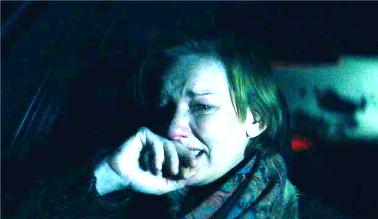 The husband of a famous author falls to his death, and the wife is prosecuted for murder, in a film about the conflicting truths of intimate relationships.
The husband of a famous author falls to his death, and the wife is prosecuted for murder, in a film about the conflicting truths of intimate relationships.
Film marketers and critics always try to fit a movie into a slot, a recognizable genre or type of narrative. That can be problematic. Anatomy of a Fall, the new film from French director Justine Triet, is being a called a thriller, but to take that label at face value is to distort its true quality. There are no thrills here. There is a mystery that becomes a courtroom drama, yet even that can be misleading.
Sandra Voyter, played by German actress Sandra Hüller, is a well-known author living in a cabin in the French Alps with her husband Sam, also a writer, and their 10-year-old son Daniel. We open with Sandra being interviewed in her living room by a young woman, presumably for some article, but as they talk the music playing upstairs becomes louder and louder. It’s her husband, Sandra says, who always does this when he’s doing repairs and refurnishing, which he’s doing in the attic right now. But the music gets so loud that the interview can’t go on, and Sandra apologizes, saying they can meet somewhere else at some future point.
Then we see young Daniel in sunglasses, not blind but visually impaired, wandering around the woods with his dog. Returning home eventually, with the loud music still playing, he finds his father, Sam, lying in a pool of blood on the snow in front of the house. This is the first time in the film we see Sam. Daniel screams for his mother, Sandra runs out; we then see her calling the emergency number while Daniel sobs. Cut to the emergency medical personnel putting the body into an ambulance. Sam is dead.
So how did this happen? Sandra seems mystified, and a few days later when her lawyer friend visits and asks probing questions, her account of what she was doing doesn’t explain much. A process begins in which police investigators build a case for Sandra having murdered her husband, hitting him in the head and pushing him off a balcony. The other possibility, which Sandra brings up, is suicide. And there is evidence to support that as well, the blow being caused by Sam’s head hitting a shed below the attic window before bouncing off onto the ground. These two theories make up the point of dispute between prosecution and defense in the eventual trial.
The mystery of course presents itself to the audience, but surprisingly it is not the primary emphasis of the director, Triet. Instead, these events, fraught with trauma especially for the young son, become a means to explore interesting aspects of people, and their relationships, that don’t fit into a simple pattern. Both the prosecutor and the defense try to create this pattern. The prosecutor is out to prove that Sandra was very angry at Sam, and that her behavior on the day of Sam’s death doesn’t add up. The defense argues that she is innocent of all of this, and was still committed to the marriage. But when it’s revealed that there’s a recording of an argument between the couple, and the court listens to it, we realize how variable and complex their behavior is, and in fact how this is true for us as well, for everybody going through the day-to-day events and reactions in a relationship. The truth is never pretty or simple or perfect.
Anatomy of a Fall wants to tear away the false curtain that hides and distorts our lives. It is a subtly evocative and ultimately devastating film.

Mayhem can be fun. In a movie, I mean, not in real life. There’s a subgenre of crime films in which hapless characters get...

A junior high school in Germany is a microcosm of society in The Teachers’ Lounge, a film directed by İlker Çatak, and written by...

The story of a young woman’s struggle with her overprotective mother, and her fascination with a woman directing her in an experimental theater group,...